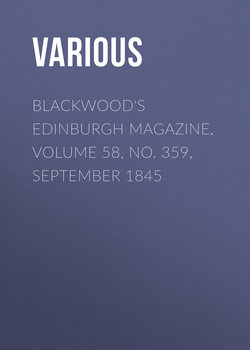Blackwood's Edinburgh Magazine, Volume 58, No. 359, September 1845

Реклама. ООО «ЛитРес», ИНН: 7719571260.
Оглавление
Various. Blackwood's Edinburgh Magazine, Volume 58, No. 359, September 1845
ENGLISH LANDSCAPE – CONSTABLE.1
Mahmood the Ghazavide.4
MARSTON; OR, THE MEMOIRS OF A STATESMAN
WATERTON'S SECOND SERIES OF ESSAYS.8
WARREN'S LAW STUDIES.13
MARGARET OF VALOIS
THE BARON VON STEIN.16
THE HISTORICAL ROMANCE
A FEW WORDS FOR BETTINA
NORTH'S SPECIMENS OF THE BRITISH CRITICS. No. VIII
Отрывок из книги
Change is the master-spirit of Europe, as permanency is of Asia. The contrast is in the nature of things. However the caprice, the genius, or the necessities, of the sitter on the throne may attempt to impress permanency on the habits of the West, or mutability on those of the East, his success must be but partial. In Europe we have a perpetual movement of minds, a moral ocean, to which tides and currents are an operation of nature. But the Caspian or the Euxine is not more defined by its limits of rock and mountain, or more inexorably separated from the general influx of the waters which roll round the world, than the Asiatic mind is from following the free course, and sharing the bold and stormy innovations, of Europe.
But the most rapid and total change within human memory, was the one which was now before my eye. I felt as some of the old alchymists might feel in their laboratories, with all their crucibles heating, all their alembics boiling, all their strange materials in full effervescence; and their eyes fixed in doubt, and perhaps in awe, on the powerful and hazardous products about to result from combinations untried before, and amalgams which might shatter the roof above their heads, or extinguish their existence by a blast of poison.
.....
But the ramparts of that empire of slavery and suffering were to be shaken at last. The breach was to be made and stormed by England; Europe was to be summoned to achieve its own deliverance; and England was to move at the head of the proudest armament that ever marched to conquest for the liberties of mankind.
She began by a thunder-clap. The peace with Russia had laid the Czar at the mercy of France. Napoleon had intrigued to make him a confederate in the league against mankind. But the generous nature of the Russian monarch shrank from the conspiracy, and the secret articles of the treaty of Tilsit were divulged to the British cabinet. I shall not now say from what authority they came; but the confidence was spontaneous, and the effect decisive. Those Articles contained the outline of a plan for combining all the fleets of subject Europe, and pouring the final vengeance of war on our shores. The right wing of that tremendous armament was to be formed of the Danish and Russian fleets. This confederacy must be broken up, or we must see a hundred and eighty ships of the line, freighted with a French and Russian army, at the mouth of the Thames. There was not a moment to be lost, if we were to act at all; for a French force was already within a march of the Great Belt, to garrison Denmark. The question was debated in council, in all its bearings. All were fully aware of the hypocritical clamour which would be raised by the men who were lending themselves to every atrocity of France. We were not less prepared for the furious declamation of that professor of universal justice and protector of the rights of neutral nations – the French Emperor. But the necessity was irresistible; the act was one of self-defence; and it was executed accordingly, and with instant and incomparable vigour. A fleet and army were dispatched to the Baltic. An assault of three days gave the Danish fleet into our hands. The confederacy was broken up by the British batteries; and the armament returned, with twenty sail of the enemy's line, as trophies of the best planned and boldest expedition of the war.
.....